Operations and Institutional Management
Operations Division is committed to striving for perfection and exerting our utmost to uphold the rule of law, with a number of satisfying achievements in custodial management.
All correctional staff make concerted efforts to ensure public safety and maintain security, order and discipline of correctional facilities so as to minimise the chance of escapes and acts of indiscipline and prevent the smuggling of dangerous drugs, so that a secure, safe, humane, decent and healthy custodial environment can be ensured for persons in custody.
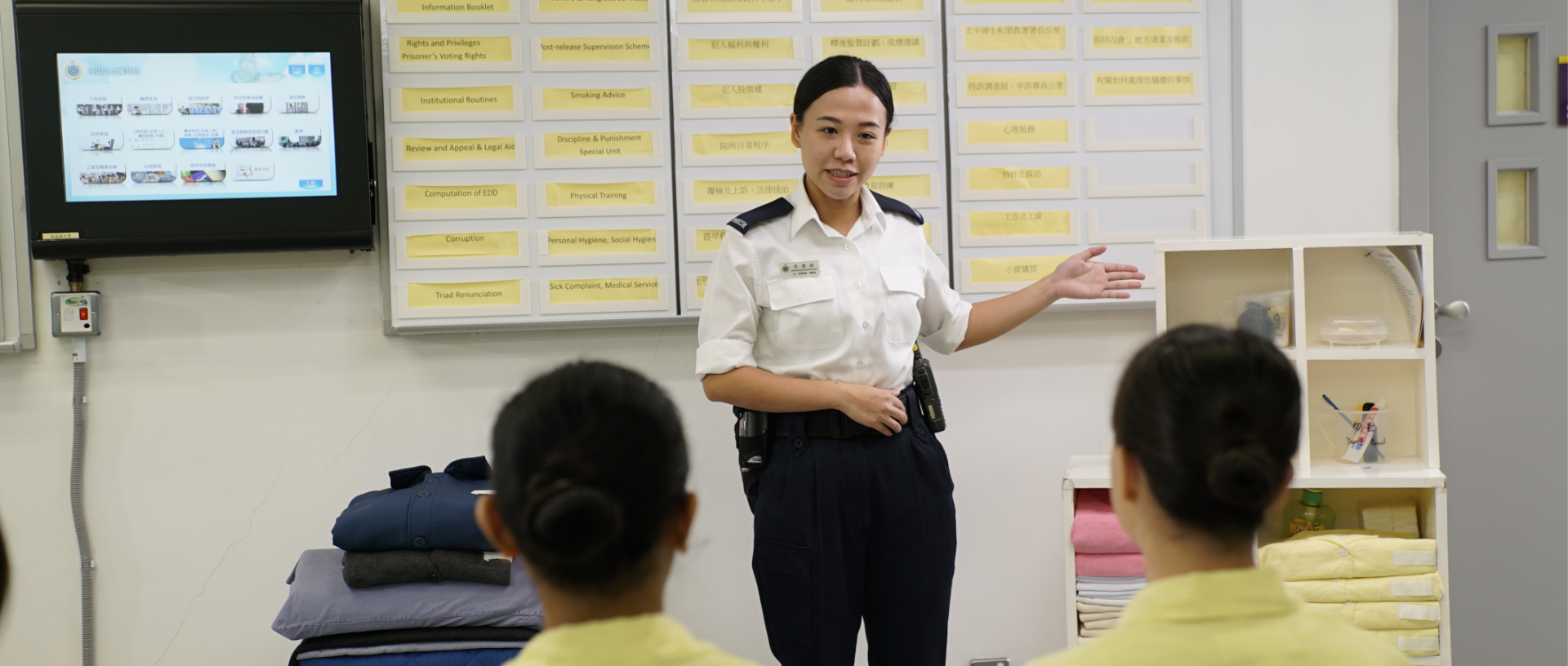
Correctional staff explains institutional rules to persons in custody attending an induction course.
For the health of persons in custody, the Department has proactively supported the Government’s policy of tobacco control and promoted a smoke-free culture among persons in custody by implementing the Smoking Cessation Counselling Programme and setting up no smoking correctional facilities, etc. The Department officially designated Tung Tau Correctional Institution and Pak Sha Wan Correctional Institution as “No-smoking Correctional Facilities” in 2013 and 2014 respectively to accommodate adult male persons in custody who have decided not to smoke. The Department has also set up “no-smoking zones” in other institutions, including Stanley Prison and Lo Wu Correctional Institution. Besides, to encourage and assist persons in custody to quit smoking, the Department has been working with the Hong Kong Council on Smoking and Health (COSH) since 2018 for arranging persons in custody to participate in the “Quit to Win” Smoke-free Community Campaign jointly organised by COSH, and School of Public Health and School of Nursing of the University of Hong Kong. Smoking Cessation Counselling Programme with the provision of nicotine replacement therapy is organised for adult persons in custody to relieve symptoms of nicotine withdrawal and help them quit smoking.
To facilitate persons in custody to vote in local elections, respective dedicated polling stations were set up in correctional facilities to allow eligible electors in custody to vote in the 2019 Yau Tsim Mong District Council By-election for the Tai Nan Constituency, Yuen Long District Council By-election for the San Tin Constituency, 2019 Rural Ordinary Election and 2019 District Council Election.
Moreover, the Department has all along conducted timely reviews on changes in penal population and the corresponding policies. To further optimise the deployment of institutional resources, we will devise appropriate schemes to renovate institutions or convert the use of institutions. In view of the changes in penal population and operational arrangement in recent years, the Department rolled out a new round of resources redeployment schemes in mid-2019 to transfer some of the remand persons in custody from Lai Chi Kok Reception Centre to Stanley Prison to enhance cost-effectiveness in the operation of correctional institutions. Besides, the pilot Official Visit e-Booking System has been launched at Lai Chi Kok Reception Centre since mid-2018 and is well-received by the stakeholders. In light of the success of the pilot system, the Department extended the e-booking service to other institutions in September 2019. The e-booking service not only facilitates institutions in better utilisation of resources but also shortens the waiting time for visitors. The effectiveness of our services is thus further enhanced.
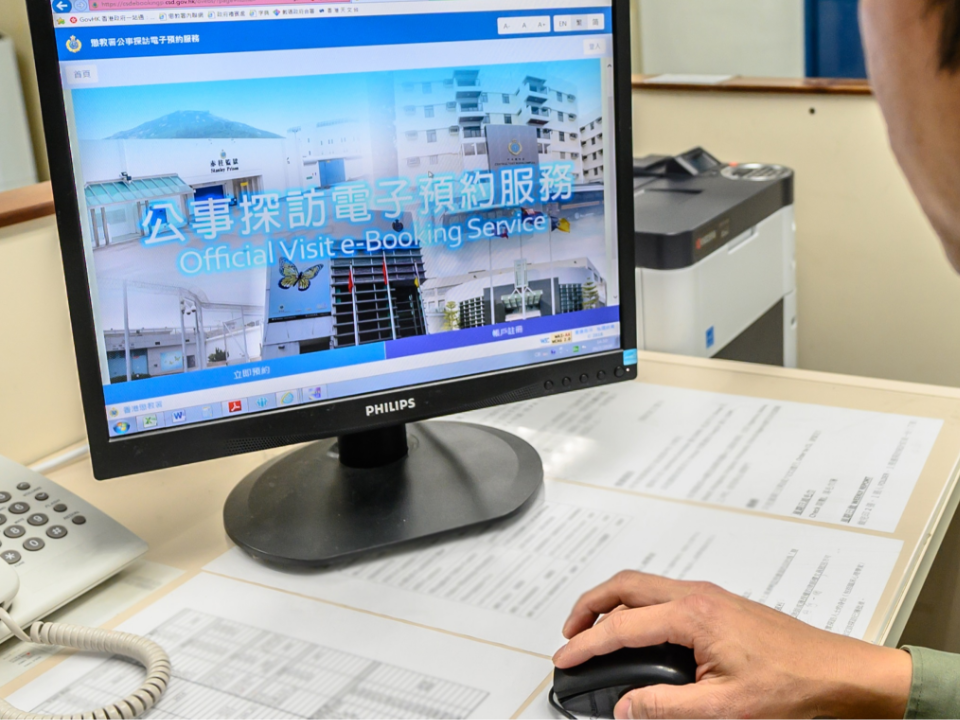

Official Visit e-Booking System has proved to be effective.
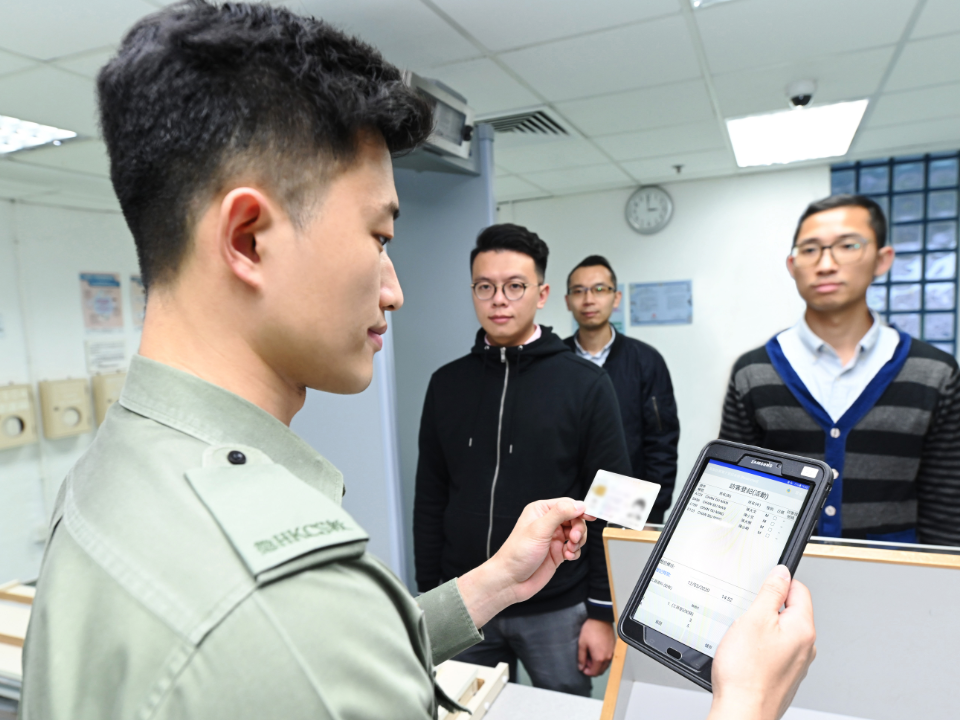
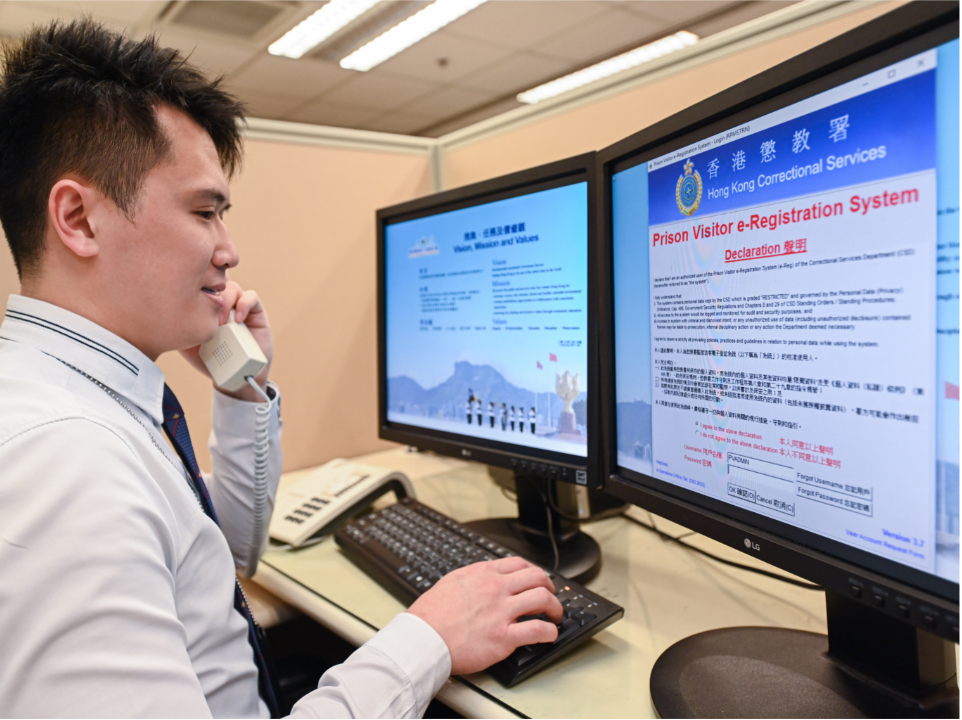
Prison Visitor e-Registration System has come into operation.
In May 2016, the Finance Committee of the Legislative Council approved a funding commitment of $353 million to implement the Integrated Custodial and Rehabilitation Management System (iCRMS) with enhanced functions to replace the existing eight core operation systems and upgrade the capacity of IT infrastructure. Upon the completion of the tendering exercise, the contract for iCRMS was awarded in May 2018. Currently, the project is at the stage of system analysis and compilation of user requirements, followed by coding of system programs. The first two iCRMS pilot functions, namely canteen purchase using self-service kiosk and keys and equipment management using Radio Frequency Identification technology, were rolled out in the fourth quarter of 2019 in Tung Tau Correctional Institution, Tai Lam Centre for Women and Lai King Correctional Institution.
With the professionalism and perseverance of our staff, the Operations Division has kept abreast of time, lived up to ever-rising challenges with an innovative mindset and endeavoured to further enhance the operational efficiency and professional image of the Department.
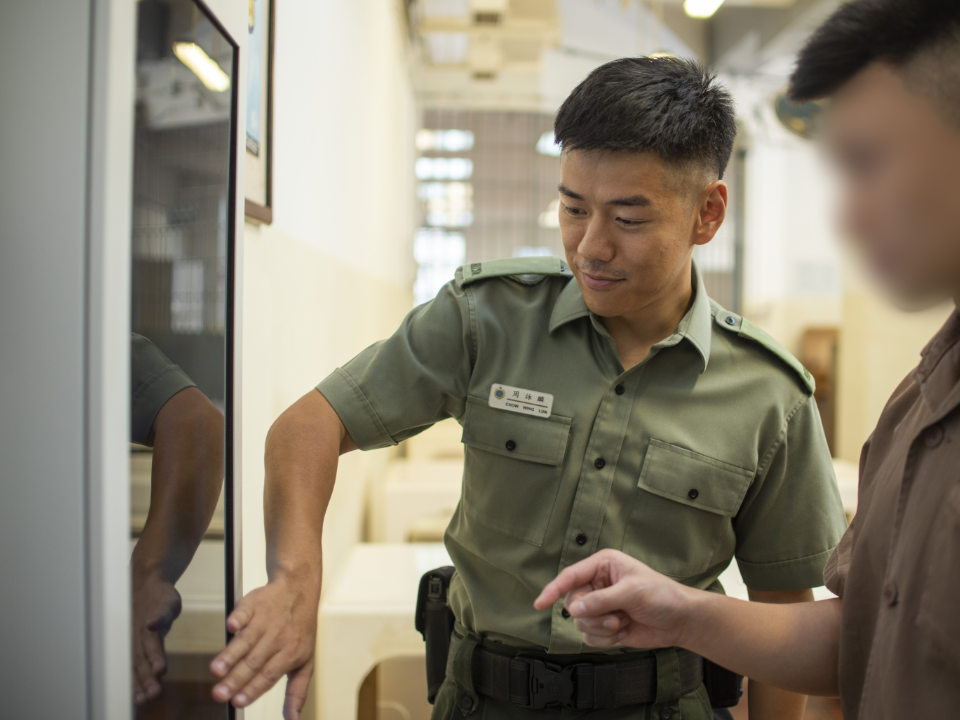
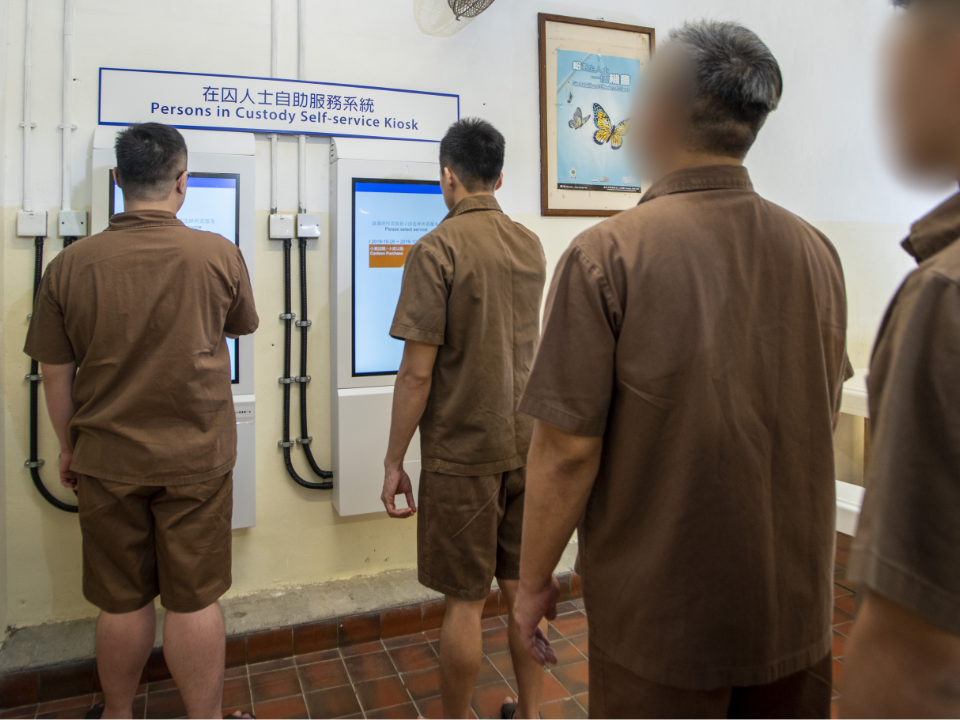
Persons in custody use self-service kiosks for canteen purchases.
Male Persons in Custody
In 2019, a total of 5670 adult males were sentenced to imprisonment and 3348 remanded in our custody. Adult persons in custody on long term sentences, including life imprisonment, are accommodated in Stanley Prison and Shek Pik Prison. There were 105 young males under the age of 21 sentenced to imprisonment and 196 remanded in our custody. Pik Uk Correctional Institution is a maximum-security institution functioning as a remand centre and a prison for young male persons in custody.
Adult males sentenced to imprisonment
Adult males remanded in our custody
Young males under the age of 21 sentenced to imprisonment
Young males under the age of 21 remanded in our custody

Female Persons in Custody
In 2019, a total of 2586 adult females were sentenced to imprisonment and 994 remanded in our custody. Tai Lam Centre for Women is a maximum-security institution functioning as a remand centre and a prison for adult women. Established in 2010, Lo Wu Correctional Institution is an institution for female adults, with one minimum-security wing and two medium-security wings. A total of 26 young females under the age of 21 were sentenced to imprisonment and 33 remanded in our custody. They are accommodated in Lai King Correctional Institution.
Adult females sentenced to imprisonment
Adult females remanded in our custody
Young females under the age of 21 sentenced to imprisonment
Young females under the age of 21 remanded in our custody

General Treatment in Prisons
After assessment by the Classification and Categorisation Board, persons in custody attend induction course covering rules and regulations, rights, privileges and welfare assistance, etc. related to their incarceration. Various rehabilitation programmes including vocational training in a wide range of trades, recreational activities and physical exercises are provided to persons in custody during their incarceration. To assist persons in custody of different ethnicities to familiarise themselves with the matters to note and relevant information on prison life as soon as possible, we provide them with an information booklet for persons in custody in 27 languages (i.e. 28 versions including traditional and simplified Chinese versions). Tablet computers with translation function for 62 languages have also been used to further facilitate the communication between correctional officers and foreign persons in custody.
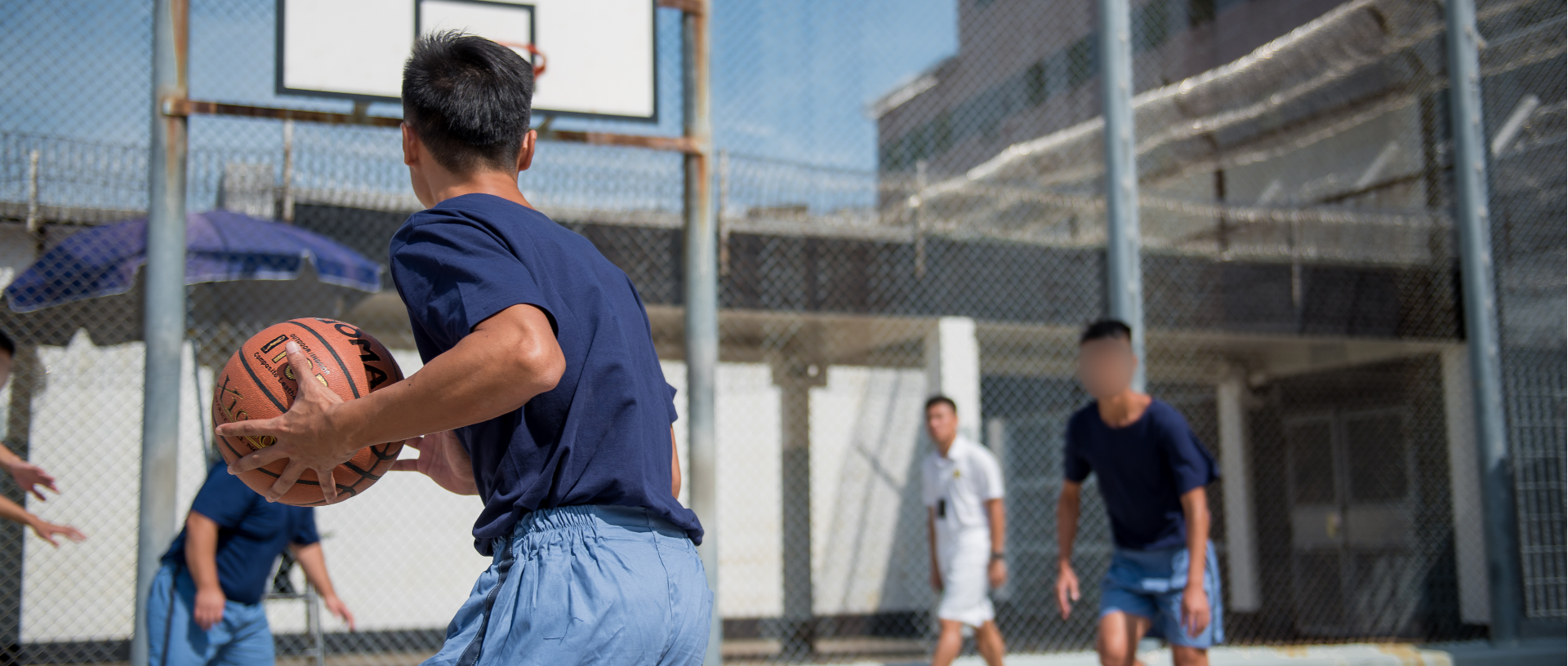
Persons in custody participate in recreational activities and physical exercises.
Labouring
Adult persons in custody have to work six days a week as required by law. It aims to engage them in meaningful work, enabling them to build up good working habit and acquire vocational and employability skills.
Diet
Under the prevailing regulation, the Department provides persons in custody with plain and wholesome food. The various dietary scales currently provided by the Department are designed by dietitians and approved by the Department of Health. The scales meet the nutritional needs of persons in custody. Having regard to the health, dietary and religious needs of persons in custody, the Department provides four main dietary scales. Meals are prepared by persons in custody under the guidance of qualified Catering Instructors. To ensure food quality, the meals are inspected and tasted before distribution.
Complaint Mechanism
The Department has all along attached great importance to the treatment of persons in custody and the handling of complaints. Persons in custody aggrieved by any treatment they received during their incarceration may lodge complaints or air their grievances through various internal and external channels. Internal channels include complaining to the institutional management, directorate officers of the Headquarters visiting the correctional institutions or the Complaints Investigation Unit of the Department. External channels include complaining to Members of the Legislative Council, The Ombudsman, visiting Justices of the Peace, statutory bodies, other law enforcement agencies or government bureaux, etc.
Training Centres, Detention Centre, Rehabilitation Centres and Drug Addiction Treatment Centres
Under the existing rules and regulations, apart from imprisonment, convicted persons in custody can also be sentenced to Training Centres, Detention Centre, Rehabilitation Centres and Drug Addiction Treatment Centres. The Training Centres Ordinance stipulates that young persons in custody shall receive six months to three years of training which is fully individualised. Their release is based on individual performance. Qualified teachers with relevant experience will conduct comprehensive educational and vocational training classes for young persons in custody. Recreational activities are organised regularly by qualified instructors. Sha Tsui Correctional Institution accommodates young male detainees and offers them a stringent training programme, including physical training and foot-drills with emphasis on strict discipline and hard work, in order to instil in detainees respect for the law. Rehabilitation Centres provide training for young persons in custody in need of a short-term rehabilitation programme. The programme consists of two phases with a total period of detention ranging from three to nine months. In the initial detention period, all young persons in custody shall receive education and vocational training. In the subsequent period of residence, all young persons in custody, after studying, working or engaging in approved activities, will reside in Rehabilitation Centres. Hei Ling Chau Addiction Treatment Centre accommodates adult male drug abusers while Lai Sun Correctional Institution accommodates both adult and young male drug abusers. Nei Kwu Correctional Institution and Lai King Correctional Institution accommodate adult and young female drug abusers respectively. Treatment, which lasts from two to 12 months, combines work and therapy to rid individuals of drug dependence and correct criminal behaviour.
Training
Centres
Centres


95.2% Male
4.8% Female
Detention
Centre
Centre


83.3% Under the age of 21
16.7% aged 21 to under 25
Rehabilitation
Centres
Centres


92.5% Male
7.5% Female
Drug Addiction
Treatment Centres
Treatment Centres


93.6% Adult persons
6.4% Young persons
Health Care for Persons in Custody
All correctional facilities have on-premises hospitals staffed by qualified personnel. In collaboration with the Department of Health, round-the-clock basic health care services are provided in all correctional facilities. Persons in custody at the Siu Lam Psychiatric Centre are attended to by visiting psychiatrists from the Hospital Authority. Besides, visiting medical specialists, such as dentists, surgeons, and orthopedic and ophthalmology specialists from the Hospital Authority or the Department of Health provide regular consultations and treatments to persons in custody. Working in collaboration with Castle Peak Hospital, the Department has conducted a clinical research on psychiatric telemedicine consultation for persons in custody at Lai Chi Kok Reception Centre since June 2014. In December 2015, the research study was extended to Tai Lam Centre for Women. Apart from Castle Peak Hospital, the Department has explored the feasibility of conducting the clinical research on psychiatric telemedicine consultation with other public hospitals. In April 2017, the Department collaborated with Kwai Chung Hospital to conduct relevant research and the study was subsequently extended to Hei Ling Chau Addiction Treatment Centre and Lo Wu Correctional Institution. The research study conducted with Castle Peak Hospital was completed in May 2018 with findings confirming the effectiveness of psychiatric telemedicine consultation. After discussion with the Department, the Hospital Authority has approved the regularisation of the service of psychiatric telemedicine consultation in Castle Peak Hospital since August 2018.
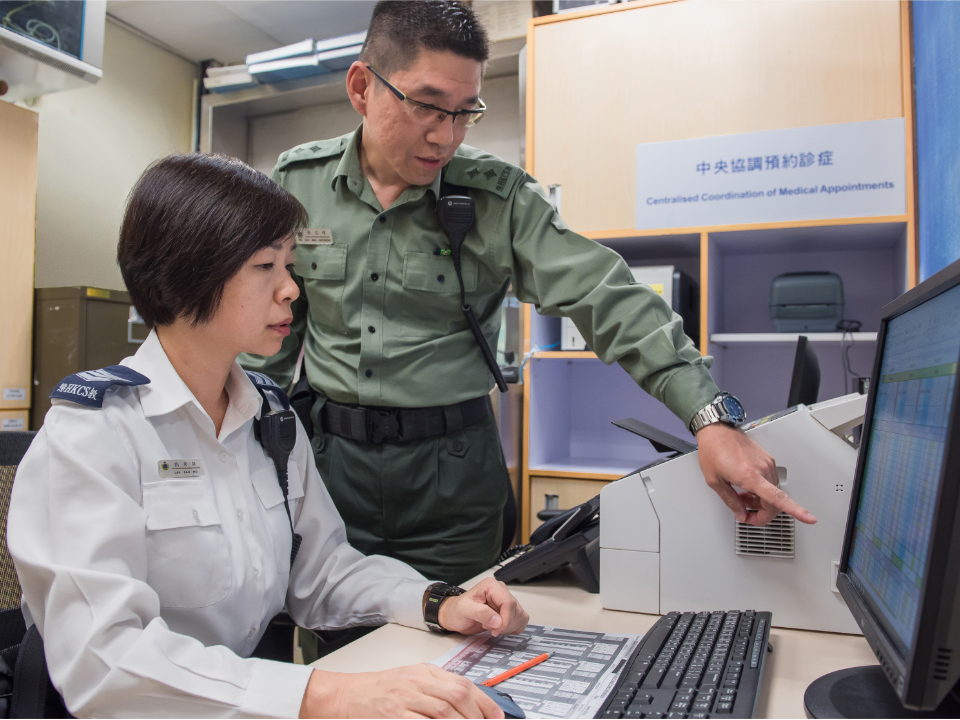
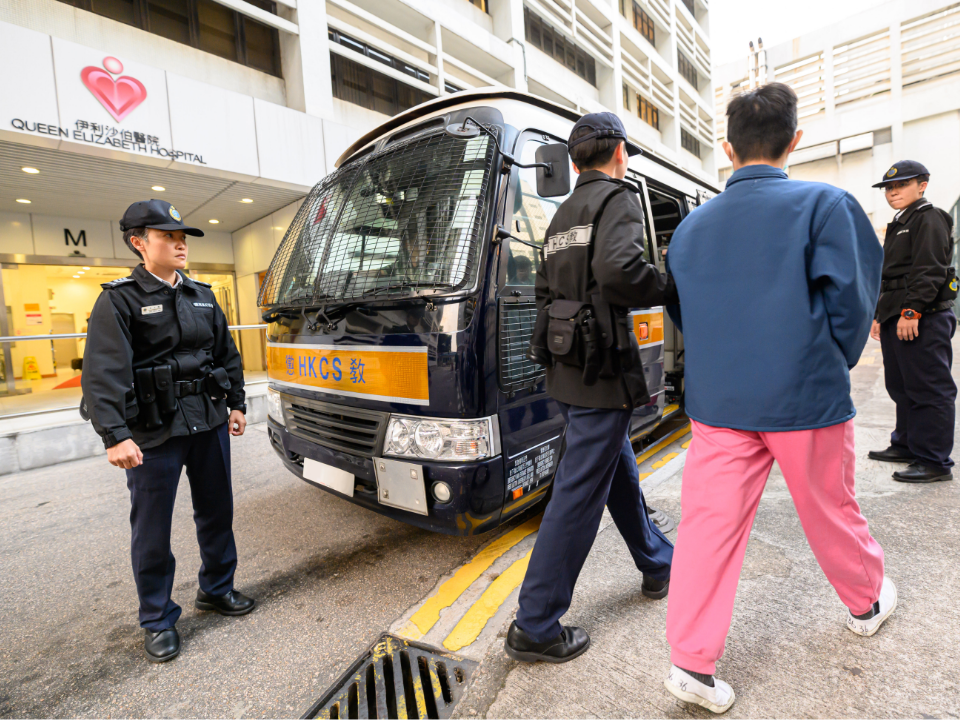
CSD has launched Centralised Coordination of Medical Appointments at the custodial ward in Queen Elizabeth Hospital for the purpose of strengthening the security risk management of escorting persons in custody to attend medical appointments outside prisons.
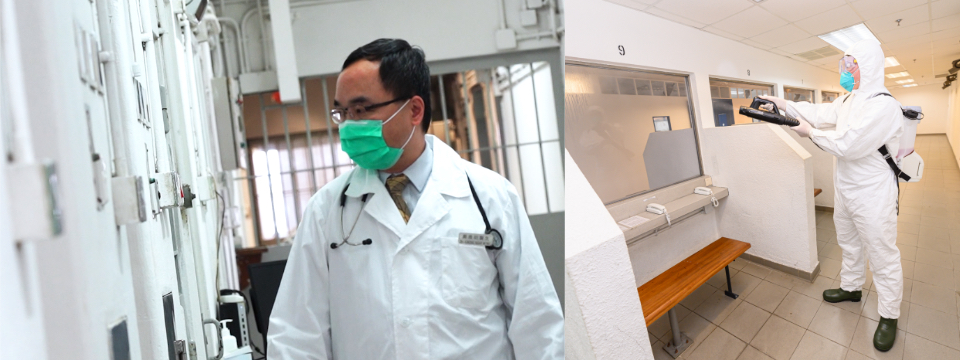
CSD is committed to providing a decent and healthy custodial environment.
In June 2016, outreaching gynaecological services were put into operation at Lo Wu Correctional Institution and gynaecology consultations were provided to persons in custody on a regular basis by Medical Officers from Obstetrics & Gynaecology, Prince of Wales Hospital. To further reduce the security risk posed to the public when persons in custody are attending medical appointments in outside clinics, the Department has been working with stakeholders through different channels to optimise the workflow of providing healthcare services, including the implementation of Centralised Coordination of Medical Appointments in Queen Elizabeth Hospital for the purpose of strengthening the security risk management of escorting persons in custody to attend medical appointments. Apart from reducing the impact on the daily operation of public hospitals and members of the public, the above measure can protect the privacy of persons in custody, avoid their embarrassment and physical discomfort during escorts. Pregnant persons in custody will be provided with antenatal checkups and postnatal care, and be arranged to give birth in public hospitals. In general, cases requiring in-patient care at public hospitals are admitted to our custodial wards either in Queen Mary Hospital or Queen Elizabeth Hospital. To ensure quality health care and enhance the professional knowledge and skills of our healthcare staff, we from time to time organise professional training courses for our healthcare staff jointly with the Department of Health, the Hospital Authority and accredited academic bodies such as universities.
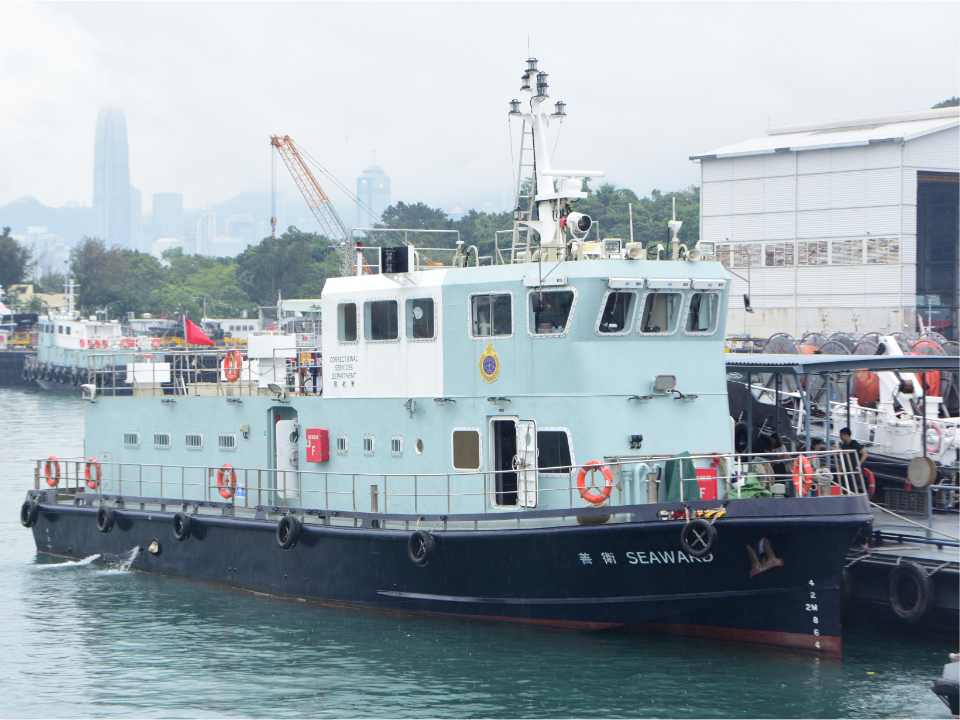
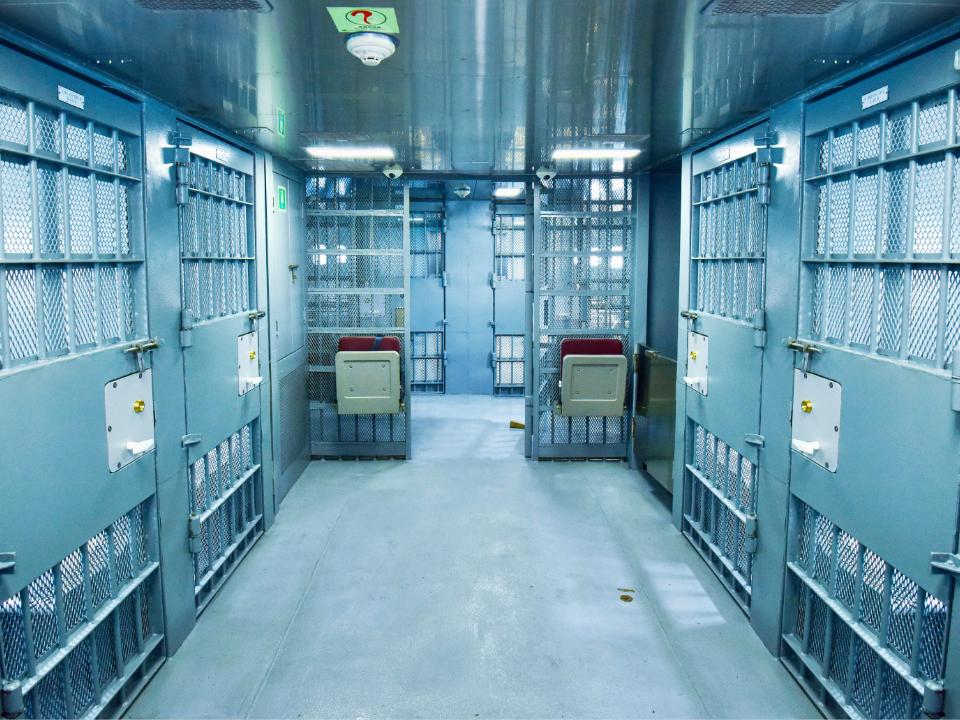
A maiden voyage ceremony for the new “Seaward” was held on 17 April 2019.
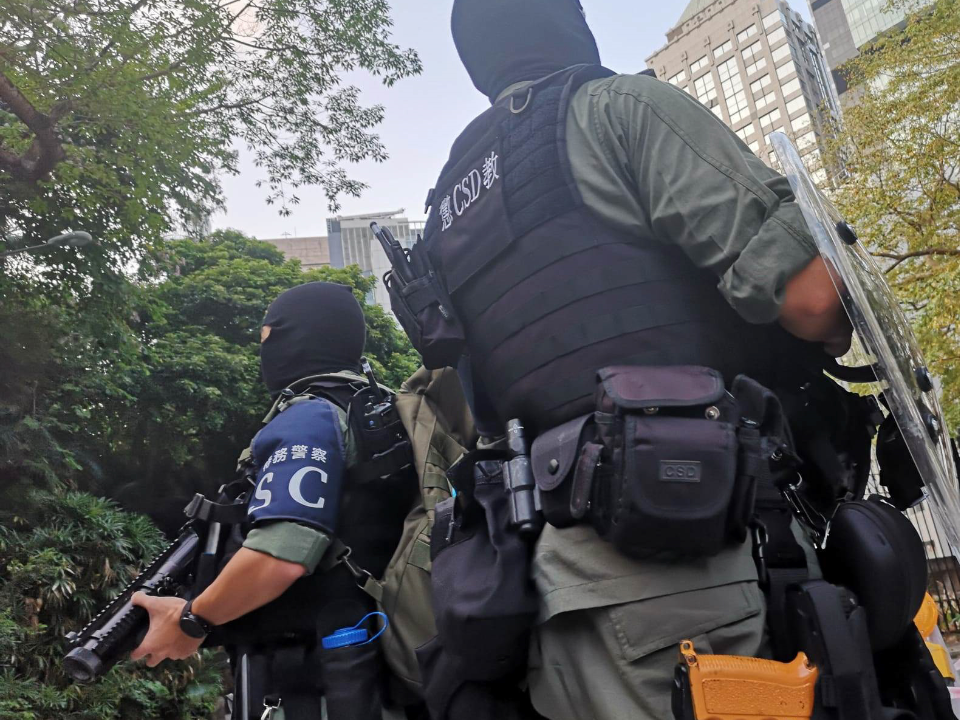
Correctional Officers are appointed as Special Constables to carry out duties including guarding government premises, assisting in anti-riot operations and handling emergencies, etc.
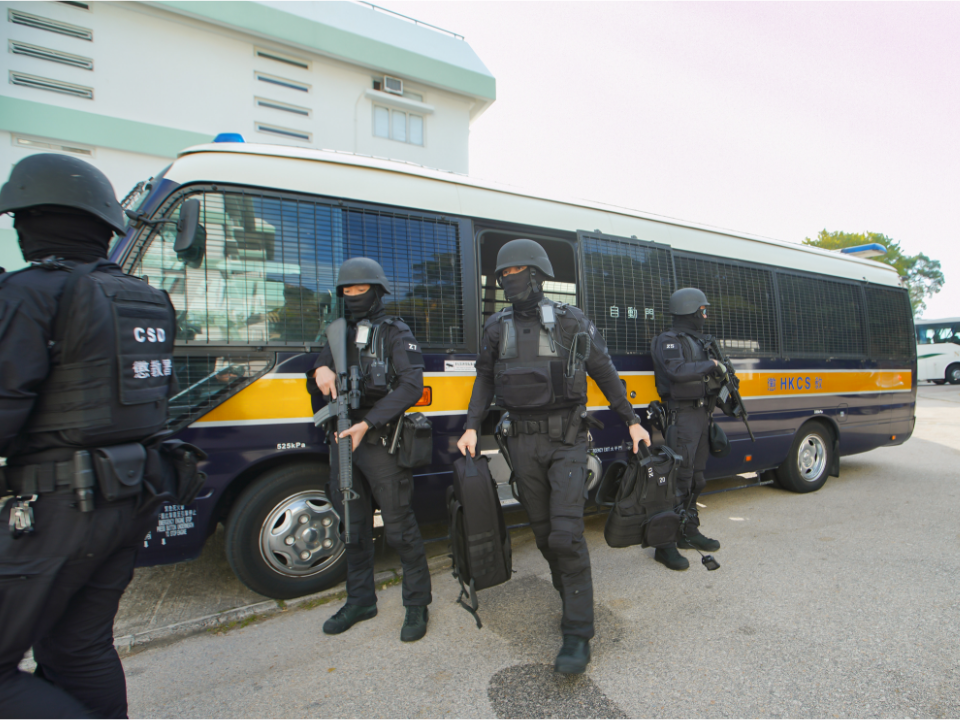
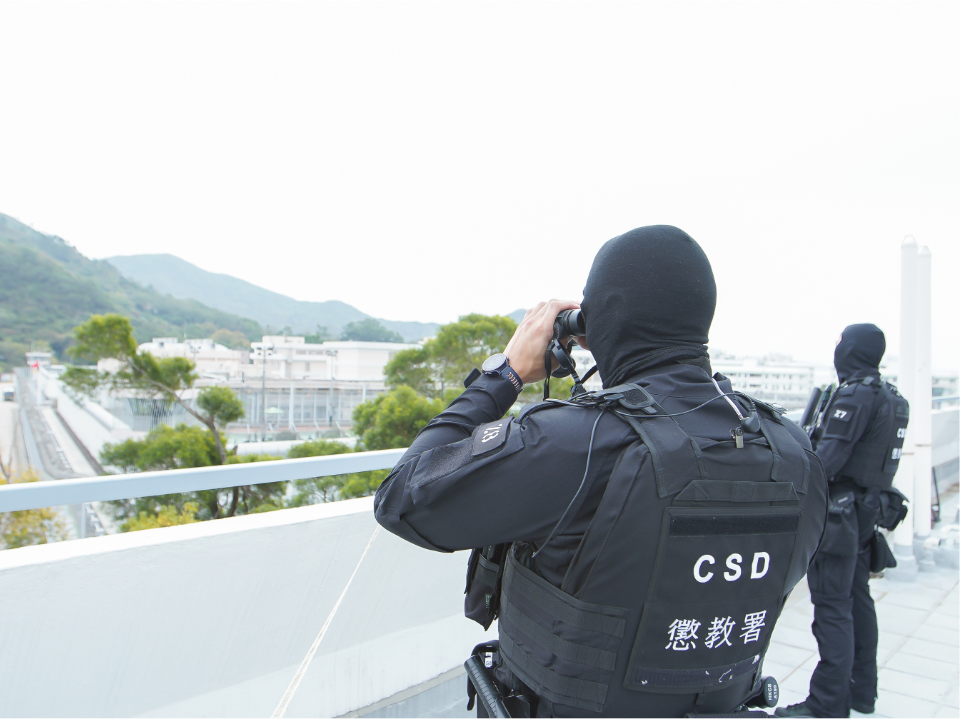
The Regional Response Team participates in a regional defence exercise.
Escort and Support Group
The Group escorts persons in custody for court attendance, medical treatment, identification parade or inter-institutional transfer, and provides correctional facilities with tactical support during emergencies. The Group is also responsible for the management of Cell Holding Units in the Court of Final Appeal, High Court and District Court, West Kowloon Transit Centre, the custodial wards in Queen Mary Hospital and Queen Elizabeth Hospital as well as the Departmental Transport Office. Correctional Emergency Response Team under the Escort and Support Group provides tactical support during large-scale emergencies in correctional facilities. To respond to emergencies occurring within correctional facilities, strengthen the security in the vicinity of institutions and carry out such tasks as high-risk escort duties, Regional Response Teams were set up under the Escort and Support Group in September 2016 with a view to providing more effective, prompt and tactical support at regional level. To promote interflow with international counterparts for sharing expertise and to strengthen the emergency response capability of our staff, in mid-2019, the Department sent a delegation of 12 members from Correctional Emergency Response Team and Regional Response Team to take part in the Mock Prison Riot 2019, Tactical Skill Competition cum Weapon and Equipment Exhibition in West Virginia, USA. The delegation team clinched the overall second runner-up position which was the best result among participating teams from Asia. Regarding escort and support, the existing “Seaward” responsible for sea escort has served the Department for 26 years since 1993. Some of the components have notably been operated with deteriorating performance due to aging, or even become obsolete and are no longer available in the market. To fulfill the operational need of detaining persons in custody in a safe, secure and humane manner while ensuring the safety of our officers and crew members, and to avoid unnecessary maintenance work, a new vessel has been procured to replace the existing one. A maiden voyage ceremony was held on 17 April 2019.
To stop violence in full force, Correctional Services Department officers have been appointed as the first batch of Special Constables. They commenced their duty in November 2019 and were mainly responsible for guarding government premises, assisting in anti-riot operations and handling emergencies.
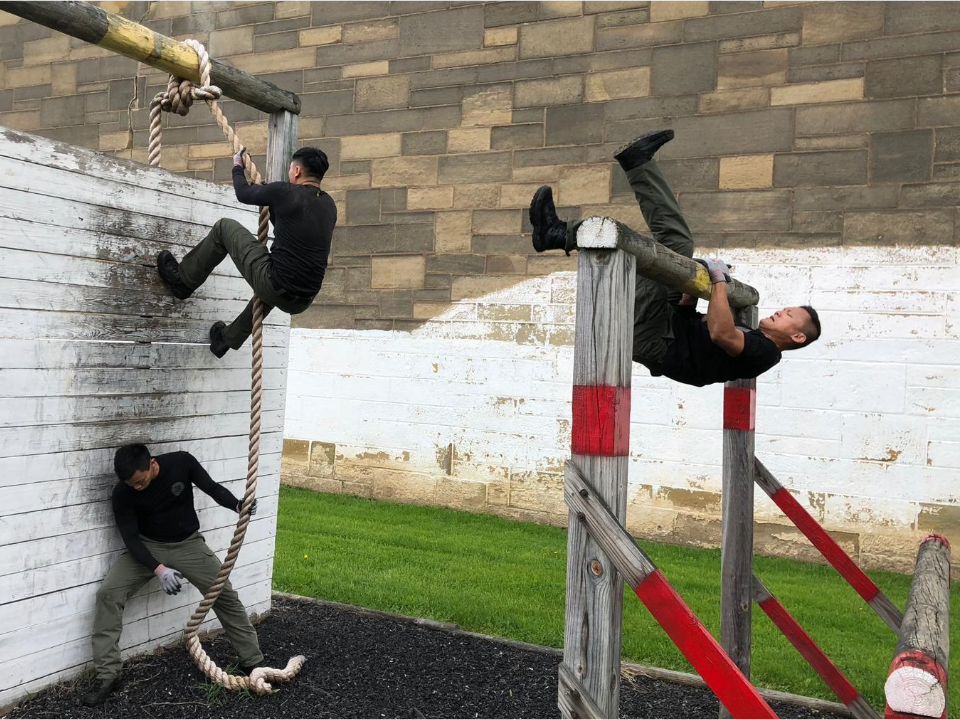

Representatives of the Correctional Emergency Response Team and Regional Response Team clinched the overall second runner-up in the Mock Prison Riot 2019, Tactical Skill Competition cum Weapon and Equipment Exhibition held in West Virginia, USA.
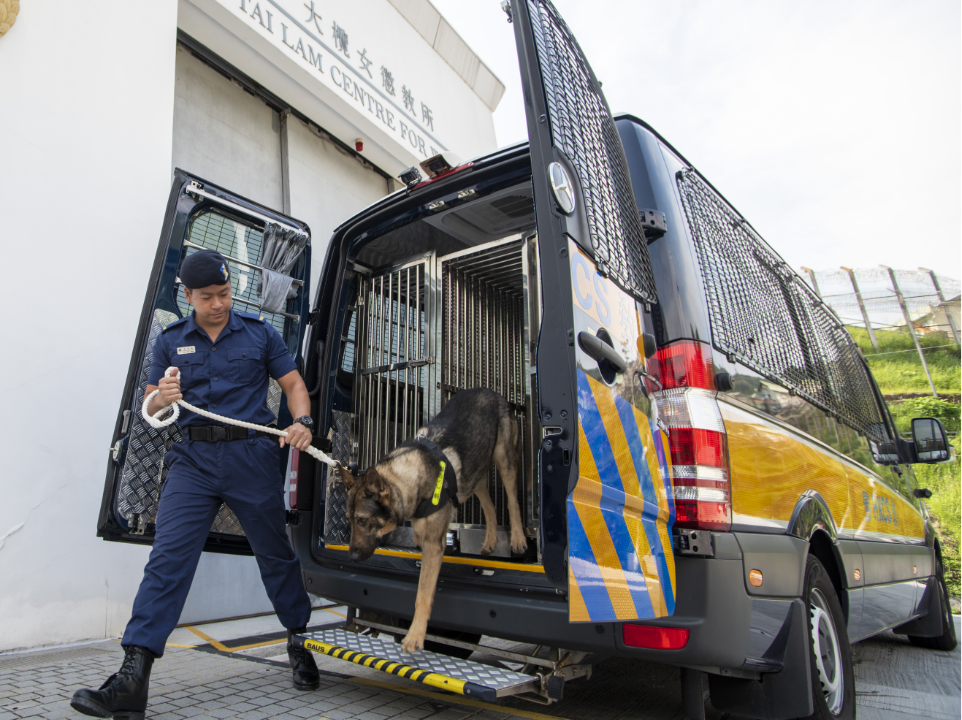
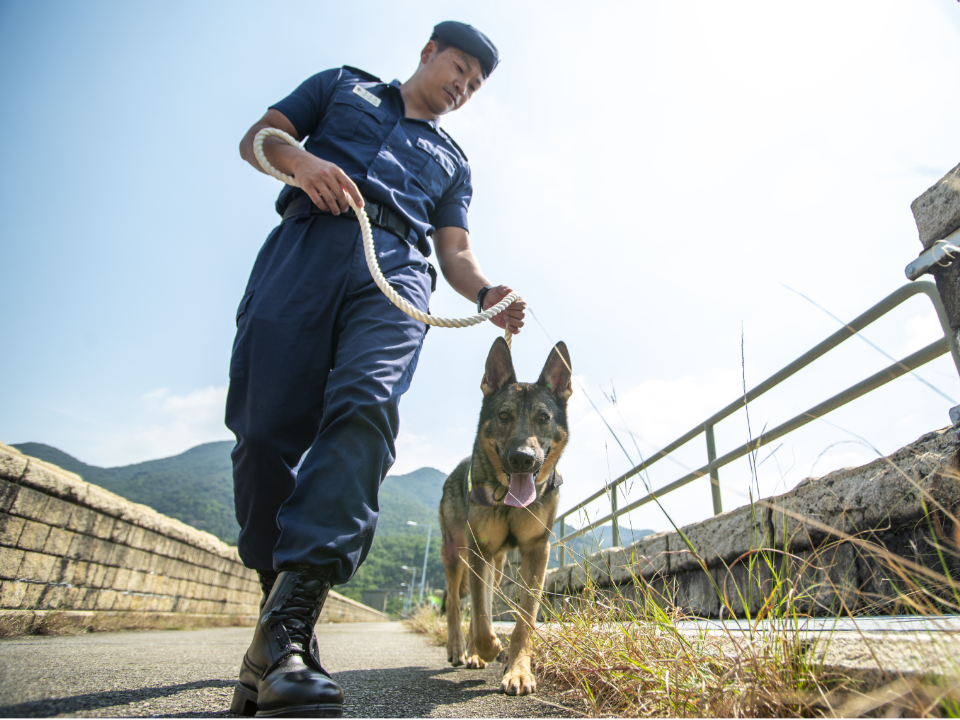
Canines assist correctional staff with patrol duties.
Correctional Services Dog Unit
Canines are trained to carry out patrols and sniff out contraband (dangerous drugs, explosives substances, cigarettes, alcohol and phones) for supporting the surveillance of correctional facilities. There are five regional dog teams located on Hong Kong Island, and in the New Territories, Hei Ling Chau, Lantau Island and Lo Wu, with a total of 68 dogs. The Training and Support Team of the Unit is responsible for breeding, raising, training canines, and taking care of sick canines.
Currently, the Dog Unit has four breeds of canines, including German Shepherd Dog, Kunming Dog, English Springer Spaniel and Labrador Retriever. They are responsible for duties in different fields. Since 2010, the Unit brought in Kunming Dogs from Mainland China to serve as working dogs, making CSD a pioneer in using this breed as working dogs among Hong Kong disciplinary forces. With strong adaptability to temperature discrepancy and high obedience, Kunming dogs are good at carrying out security duties in penal institutions.
